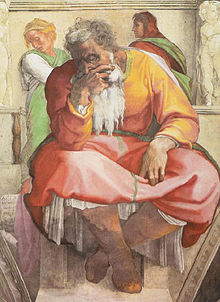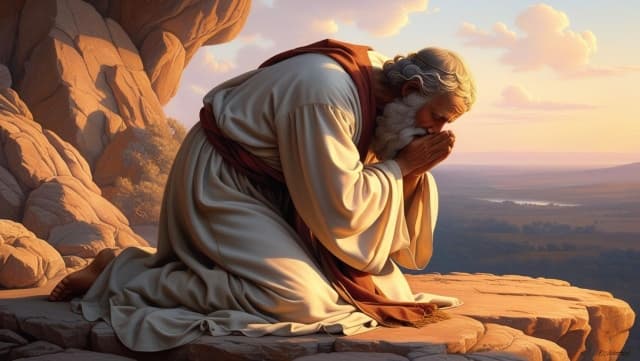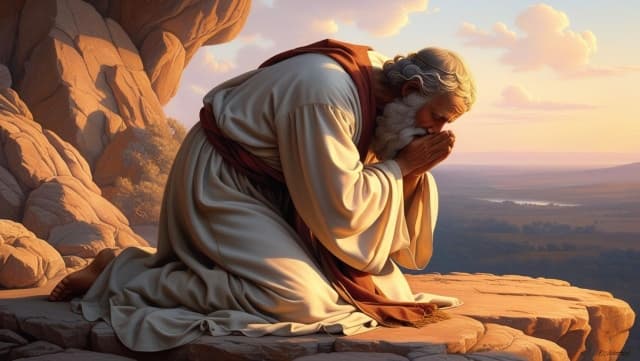Introduction to the Book of Jeremiah

The book of Jeremiah has more biographical material than any of the other prophetic books, enabling us to see the inner life of an Old Testament prophet. Much of what is known about the last days of Judah and of the troubled events related to the fall of Jerusalem derives from the book of Jeremiah
The book of Jeremiah presents the life of an eloquent man, a man who was sensitive in his relationship with God, and a man who was eloquent in proclaiming God’s message to the people of Judah.
God called Jeremiah to minister to the Southern Kingdom at a critical time in the life of the nation. For almost half a century, Jeremiah, proclaimed the word of God to a rebellious people. In response to Jeremiah’s call for repentance, kings, prophets, priests, and inhabitants of Judah refused to listen to him. The people’s rejection caused Jeremiah to struggle with his call and his vocation to be a prophet.
Jeremiah was born in Anathoth, a village located north of Jerusalem. Jeremiah was the son of Hilkiah. Hilkiah was a priest, but he was not the Hilkiah who was the high priest in the days of Josiah (2 Kings 22:4).
Jeremiah’s family was probably descendants from Abiathar, the priest whom Solomon banished to Anathoth for his participation in Adonijah’s effort to become king after the death of his father David. Jeremiah’s family traces back to Moses and Aaron through Eli, the priest who ministered in the sanctuary at Shiloh during the early days of Samuel.
The book of Jeremiah is a difficult book to study. The chronological problems and the mysterious arrangement of the book are evidence that the canonical shape of the book is the result of a long history of transmission, which can no longer be clearly understood in all its detail.
The composition of the book of Jeremiah is also a matter of debate. As it is, the book probably went through several editions. The first edition of the book probably was Jeremiah 1:1–25:13 [H14]. This section is considered to be part of the first edition because it is here that the Septuagint [LXX] added the oracles to the nations.
After King Jehoiakim burned the first edition of the book, Jeremiah dictated his oracles to Baruch, his secretary. Baruch also added some extra material to the book, “Then Jeremiah took another scroll and gave it to the secretary Baruch, son of Neriah, who wrote on it at Jeremiah’s dictation all the words of the scroll that King Jehoiakim of Judah had burned in the fire; and many similar words were added to them” (Jeremiah 36:32). This is the second edition to the book.
At a later time, Baruch added more oracles and biographical information about Jeremiah plus material about Jeremiah in Egypt (Jeremiah 40–44). This is the third edition of the book.
The fourth edition of the book was produced during the exile or the postexilic period when people who were in agreement with Jeremiah’s message added other materials that were being circulated orally or in written form. Jeremiah 52:31–34 mentions the release of King Jehoiachin of Judah in the thirty-seventh year of the exile of the people of Judah to Babylon.
The book of Jeremiah begins with his call to the prophetic ministry. When Yahweh called Jeremiah to be a prophet, Jeremiah was a young man who was reluctant to be a prophet because he was young and inexperienced. Jeremiah received a very difficult message from Yahweh: he was to announce God’s judgment on Judah for its rebellion and apostasy.
When Yahweh’s word came to Jeremiah, the message he received was a message of judgment and hope: “today I appoint you over nations and over kingdoms, to pluck up and to pull down, to destroy and to overthrow, to build and to plant” (Jeremiah 1:10).
The negative aspect of the message Jeremiah was to preach to Judah emphasizes judgment and destruction, “to pluck up and to pull down, to destroy and to overthrow.” The positive aspect of his message, “to build and to plant,” reflects the conviction that the judgment of God would not be the end of the nation. This message of hope became very important to the people who were taken captive to Babylon because it assured them that Yahweh would not abandon his people and that there was a future for them.
Jeremiah’s message of destruction became a motif that was emphasized several times in the book of Jeremiah (Jeremiah 18:7–9; 24:6; 31:28; 45:4). The reaction of the people of Judah to Jeremiah’s message of judgment and destruction placed Jeremiah’s life in peril and caused much conflict with the political and religious leaders of the nation.
Jeremiah’s family and the people of Anathoth tried to kill Jeremiah for his support of Josiah’s reforms (Jeremiah 11:18–23). Jeremiah was beaten by Pashhur the priest who put him in stocks (Jeremiah 20:1–6). The princes of Judah placed Jeremiah in a cistern filled with mud and left him there to die (Jeremiah 38:6–13). After Jeremiah preached his temple sermon (Jeremiah 7:1–15), he was prevented by the religious authorities from entering the house of the Lord to worship (Jeremiah 36:5).
King Jehoiakim gave orders to his officials to arrest Jeremiah because he was enraged by Jeremiah’s announcement that Judah would be destroyed by the Babylonians (Jeremiah 36:1–7). Jeremiah was opposed by false prophets because their message of hope and peace contradicted Jeremiah’s message of judgment.
Jeremiah was put on trial for his life because of his criticism of the political and religious leaders of Judah: “Then the priests and the prophets said to the officials and to all the people, ‘This man deserves the sentence of death because he has prophesied against this city’” (Jeremiah 26:11). Jeremiah was able to escape harsh punishment because some of the elders of the land reminded the people that the prophet Micah had preached a message similar to Jeremiah’s message and that Micah was not put to death (Jeremiah 26:10–19).
Jeremiah urged the people of Judah to submit to Babylon because that was the will of Yahweh for the nation. Because of Jeremiah’s pro-Babylonian views, Jeremiah was regarded as a traitor who was causing the people in the army to defect, “Then the officials said to the king, ‘This man ought to be put to death, because he is discouraging the soldiers who are left in this city, and all the people, by speaking such words to them. For this man is not seeking the welfare of this people, but their harm’” (Jeremiah 38:4).
In his confrontation with the false prophets, Jeremiah told them that their message of peace was not the message Yahweh had entrusted to him. The false prophets offered only superficial help for the rebellion of the people by proclaiming, “Peace, peace” when there was no peace (Jeremiah 8:11).
Jeremiah was open and honest in his relationship with God. Jeremiah wrestled with his call because of the rejection and the hostility he encountered in discharging his mission. Jeremiah expressed his struggles in six laments, also known as “The Confessions of Jeremiah.” In these laments Jeremiah complained to God about his feelings and his doubts. Jeremiah’s dialogue with Yahweh was frank and honest. Jeremiah’s words, at times, came close to insubordination or even blasphemy.
The posts below deal with several aspects of Jeremiah’s life and ministry. These posts deal with his call, his message, and his struggles with the false prophets.
Studies on Jeremiah
Jeremiah 1:1-10: The Call to Preach
Jeremiah’s Struggle with His Call
Jeremiah 20:7: The Call to Prophetic Ministry
Jeremiah and the Task of the Ministry – Part 1
Jeremiah and the Task of the Ministry – Part 2
The Call to the Ministry and the Community of Faith
Jeremiah 15:12 – Breaking Iron and Bronze
Preaching from Jeremiah 23:5-6
Jeremiah: Preaching to a Rebellious People
Jeremiah: Prophet for Pagan Times
Nebuchadnezzar and the Fall of Jerusalem
The Fall of Jerusalem and the Exile of Judah
Enkidu, Jeremiah, and the Mother of Seven
Studies on Jeremiah and the False Prophet Hananiah
Jeremiah and Hananiah: The Historical Context
Jeremiah and Hananiah: Jeremiah’s Ministry
Jeremiah and Hananiah: The Confrontation in the Temple
Jeremiah and Hananiah: True and False Prophecy in Israel
Claude Mariottini
Emeritus Professor of Old Testament
Northern Baptist Seminary
NOTE: Did you like this post? Do you think other people would like to read this post? Be sure to share this post on Facebook and share a link on Twitter or Tumblr so that others may enjoy reading it too!
I would love to hear from you! Let me know what you thought of this post by leaving a comment below. Be sure to like my page on Facebook, follow me on Twitter, follow me on Tumblr, Facebook, and subscribe to my blog to receive each post by email.
If you are looking for other series of studies on the Old Testament, visit the Archive section and you will find many studies that deal with a variety of topics.












